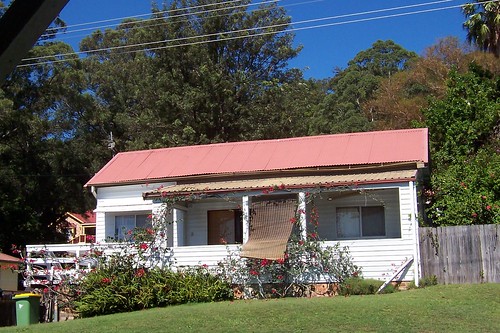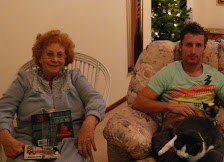If I sit very still, just as still as a mouse,
I can slip through the years into Grandma’s house:
Jump over the miles and slide down the years,
to my memory-land of laughter and tears.
Just a white-painted cottage with a white picket fence
and red-galvanised roof. There was no nonsense
about that little house – two small rooms on each side
and a long room out back. It was perfect to slide
in my socks, on linoleum that glistened like glass,
past all the doorknobs of fresh-polished brass.
Such good fun it was, in those doorknobs to stare
at my oddly-shaped image reflected there.
At the end of the hall hung a glittery thing –
a curtain of beads that would jingle and ring;
always swirling, ensnaring, then setting me free,
when shrill joyous laughter would well up in me.
In the small sitting-room there were plush armchairs.
On the arms and the backs were placed dainty squares
of ‘fancy-worked’ linen, with crocheted bands,
to catch macassar-oiled hair or little soiled hands.
Grandma’s gramophone always held pride of place
on its table with cover of velvet and lace.
While ‘His Master’s Voice’ sounded from wall to wall,
Toby Dog in its centre was my all-in-all.
In Grandma’s kitchen there stood a big hutch
made of pinewood, well-polished and filled with such
colourful treasures to pleasure the eye.
There was fine china painted with grapes, placed high
above porcelain, gold-edged, and with flowers gay,
next to blue and white earthenware, used every day.
This told the sad story of lovers who fled,
and were turned into doves flying overhead.
At the back of the house all the windows were bright
with square green and gold panes, lined with black lead-light.
And the prisms of the lamp, as the sun shone through,
became miniature rainbows of every hue.
In the yard downstairs there were paw-paw trees,
with their fans arching out to the passing breeze.
And whenever the yellow-gold fruit hung there,
we would pick some for lunch, and I’d have a share.
And my dear Uncle Tom would be whistling so clear,
All those old-fashioned songs which delighted my ear.
There’d be music-hall ditties and ‘Mother Machree,’
‘Sally in our Alley,’ and ‘My Rosary.’
It is pleasant to picture one’s childhood, I find,
as long-vanished loved ones, and scenes, come to mind.
But the dearest of all of the pictures I see,
is the one of my Grandma’s face, smiling at me.

(I wrote this poem in 1942 when I was eighteen years old, and stationed at R.A.A.F. W.T. Sigs, in Townsville, North Queensland. This was a frightening time in World War II. The A.I.F. ‘Desert Rats’ were recalled from North Africa and sent to New Guinea to reinforce Australian soldiers, striving alone to halt the seemingly unstoppable, and inhumanly cruel, Japanese advance through the islands to our north. Wounded men were sent by train regularly to hospitals in Brisbane. After the severe bombing of Darwin, with hundreds of people killed, our Government considered the feasibility in the event of invasion, of defending Australia ‘up to The Brisbane Line’. The situation of the Allies against the Axis Powers was grim on all fronts. Japan’s destruction of the U.S. Fleet in Hawaii in late 1941, without declaring war, brought the United States into the war in the Pacific, with intensification of the war effort, to the relief and benefit of Australia. Some 1,000,000 Americans had passed through Australia on their way north, by the end of the war.
When Japanese planes tried to bomb the oil tanks on the shore at Townsville, I lost my childhood feeling of being safe from harm. I had enlisted in the W.A.A.F. expecting to have a great adventure, but those expectations were quickly dashed by the frightful reality of war. Sightings of allied aircraft straggling back to Base, often with some missing after encounters with Japanese planes or warships, is with me still. So too, are my later memories as a medical secretary with the U.S. Air Force on Okinawa. Japanese prisoners in gray overalls and forage caps still lined up under guard at the Dispensary for examination. ‘Kamikaze’ planes stuck up at all angles from the sea and, off the roads or beaten tracks, Japanese landmines still claimed lives. When a weapons carrier was blown up close by, wreckage landed on the dispensary roof. There were wrecked U.S. planes, abandoned heavy weaponry, and some twenty thousand white crosses of American dead.)













